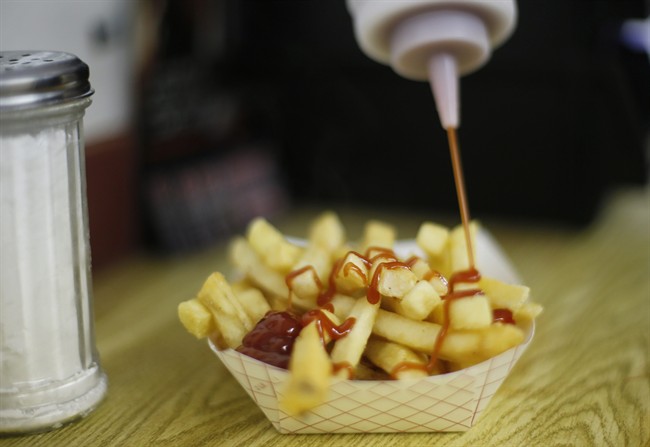TORONTO — An international group of researchers has added to the mounting evidence that people can be addicted to food in the same way as alcohol or drugs.

The researchers found that food cravings can activate different areas of the brains of people who are obese or overweight than in normal weight people, suggesting brains of those who are overweight are “hard-wired” to want food.
The findings come as no surprise to a Toronto man who said he’s been battling a severe food addiction for decades.
“I’m a food addict,” said Bob (he asked not to reveal his identity), who has been active in the Overeaters Anonymous community for more than 25 years. “There’s never enough.”
Bob believes food addiction is just as real as drug or alcohol addiction and said he would go to lengthy measures to avoid and obtain food, just like a drug addict after their next hit.
“I’ve done bizarre things like throwing a piece of pizza in the garbage and covering it with cigarette ash and half an hour later fishing it out and washed it off, because I wanted my fix of pizza,” said Bob. “That’s all there was to it.”
He described eating pounds of candy in a span of 15 minutes, to the point of feeling like he “was going to explode.” Then after a few deep breaths he’d go back for more.
“The high lasts only a very brief period of time. Because you have to keep taking more and more to perpetuate that high.” And like a drug addict, the need increases. “After a while a little bit is not sufficient. And it takes more and more and more and more. There’s no limit.”
Read more: Is obesity an illness? U.S. medical association recognizes condition as official disease
He was bulimic at one point, and weighed 300 pounds. He said he would purge himself any way he could so he could simply eat more. He estimated at one point he was consuming 10,000 calories a day.
He said “something clicked” in his brain after attending his first meeting.
“I thought, well, what I’ve been doing hasn’t been working, so I’m willing to give it a shot.”
The treatment is a 12-step program similar to those for other addictions.
“It requires daily practice,” said Bob. “I don’t think it ever goes away. As an addict it kind of lurks in the background.”
Recent findings back up what Bob has experienced: researchers in Spain and Australia looked at the differences in brain reward systems in obese and normal-weight individuals.
They did this by first feeding 39 obese and 42 normal-weight individuals a buffet meal. Later an MRI brain scanner was used, along with photos of food to stimulate food cravings. The scans showed that food cravings affected a different part of the brain on obese individuals than on a person of normal weight.
For obese individuals, the food craving stimulated the “reward-based” area of the brain more so than in people of normal weight.
Obesity carries with it numerous health risks including high blood pressure, heart disease, Type 2 diabetes and stroke.
Recent data shows that rates of childhood obesity are at peak levels in the United States and Canada, though the rates appear to have plateaued. In Canada, 13 per cent of children are considered obese and in the U.S. that rate is even higher at 17.5 per cent.
About one-quarter of Canadian adults are obese, compared to one-third of American adults.
READ MORE: Is food addiction real? Harvard study has experts weighing in
“There is an ongoing controversy over whether obesity can be called a ‘food addiction,'” said lead researcher Dr. Oren Contreras-Rodríguez.
“The findings in our study support the idea that the reward processing following food stimuli in obesity is associated with neural changes similar to those found in substance addiction.”
Three months later the researchers measured the Body Mass Index (BMI) of the study subjects and found that 11 per cent of weight gain in the obese individuals could be predicted by this brain behaviour.
- Invasive strep: ‘Don’t wait’ to seek care, N.S. woman warns on long road to recovery
- Canadian man dies during Texas Ironman event. His widow wants answers as to why
- ‘Super lice’ are becoming more resistant to chemical shampoos. What to use instead
- Solar eclipse eye damage: More than 160 cases reported in Ontario, Quebec
The research was recently presented at a European College of Neuropsychopharmacology (ECNP) conference.
Bob said he is encouraged that food addiction is slowly being recognized as a valid affliction.
“Now I recognize that behaviour, and I have not behaved that way in a very long time,” adding he still can’t be complacent about his addiction.
He said food addiction needs to be seen as an illness to be understood and treated, and there needs to be less stigma placed on those who are overweight.
“Anything that allows people to realize that it’s not a matter of willpower, and there’s no judgement attached to it, there’s no moral ethical judgement,” said Bob. “Food addiction is very real.”



Comments